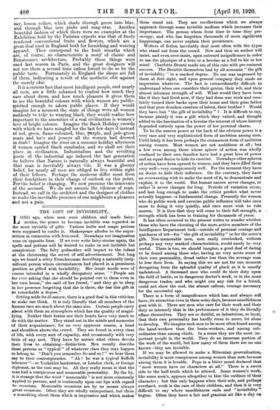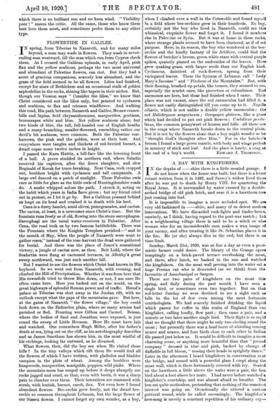THE GIFT OF INVISIBILITY.
I ONG ago, when men were children and made fairy- stories, the power to become invisible was regarded as She most enviable of gifts. Various herbs and magic potions were supposed to confer it. Shakespeare alludes to the super- stitioa in connexion with fern-seed. Nowadays our imagination runs on opposite lines. If we ever write fairy-stories again, the spells and potions will be desired to make us not invisible but oonspicuous. The fairy godmother will impart to the infant at the christening the secret of self-advertisement. Not long ago we heard a witty Frenchwoman describing a naturally insig- nificant person whom circumstances had placed in a prominent position as gifted with invisibility. Her ironic words were of course intended in a wholly derogatory sense. " People are for over asking that she should be pointed out to them even in her own house," she said of her friend, " and they go to sleep in her presence forgetting that she is there, she has this gift in so remarkable a degree."
Setting aside its ill-nature, there is a good deal in this criticism to make one think. It is only literally that all members of the human race are much about the same size. Certain people carry about with them an atmosphere which has the quality of magni- fying. Neither their brains nor their hearts have very much to do with the matter. They stand out in the minds and memories of their acquaintance, for no very apparent reason, a head and shoulders above the crowd. They are found in every class of life, with every sort of capacity, and occasionally with very little of any sort. They have by nature what others devote their lives to obtaining—distinction. Men usually describe these persons as " typical " of whatever class they may happen to belong to. "Don't you remember So-and-so ? " we hear them say to their contemporaries. " Ah ! he was a typical Suffolk labourer "—or Yorkshire landowner, or Loiidon clerk, or foreign diplomat, as the case may be. All they really mean is that the man had a conspicuous and memorable personality. By the by, it is strange that the word " memorable " is not more commonly applied to persons, and is continually upon our lips with regard to occasions. Memorable occasions are by no means always great occasions. Often they are wholly unimportant, but there
something about them which is impressive and which makes them stand out. They are recollections which we always approach through some invisible medium which increases their importance. The person whom from time to time they pre- occupy, and who has forgotten thousands of more significant happenings, can never explain their persistence.
Writers of fiction inevitably deal most often with the types who stand out from the crowd. Now and then an author will insist, and even. over-insist, upon outward insignificance in order to use the physique of a hero or a heroine as a foil to his or her mind. Charlotte Brontë made use of this ruse with pm-eminent success. The Brontes themselves had by all accounts " the gift of invisibility " in a marked degree. No one was impressed by them at first sight, and upon general company they made no impression whatever. The fact is extraordinarily difficult to understand when one considers their genius, their wit, and their almost inhuman strength of will. What would they have been like if they had lived now, if they had done war work and reso- lutely turned their backs upon their home and their grim father and that poor drunken creature of talent, their brother ? Would
they have lost " the gift of invisibility " ? It is difficult to say, because plainly it was a gift which they valued, and thought added to the fascination of a heroine the interest of whose history depended entirely upon the power of her personal charm.
To be the unseen power at the back of the obvious power is a very rare and very sophisticated form of ambition among men. Until lately it has been perhaps the commonest form of ambition among women. Most women are not ambitious at all ; but a few even among those whose sphere of action was wholly confined to their own families have had a great love of power and an equal desire to hide its exercise. Nowadays other spheres of action have been opened to women, and they have filled them very well—very conspicuously well. For the moment they have no desire to hide their influence. On the contrary, they have an overweening wish to make the most of it, to demonstrate and explain it to the world. But human nature never changes, or rather it never changes for long. Periods of variation occur, and last long enough to make the critics predict what never actually happens—a fundamental change. Presently the women who do public work and exercise public influence will take once more to doing it very quietly, and once more wish to rule unseen. It is then that they will come to their full strength, a strength which has been in training for thousands of years.
It has often occurred to the present writer to wonder whether those who have the choosing of the more active members of the Intelligence Department look—outside of personal courage and quickness of wit—for " the gift of invisibility" or for the actor's gift. Non-memorable men, men easily overlooked, without perhaps any very marked characteristics, would surely be very useful. There is too, we should imagine, a good deal of daring to be found among those who, having no very acute sense of their own personality, dread rather less than the average man to lose their lives. In saying this we are not for one moment derogating from the splendid quality of pluck as it is usually understood. A thousand men who could do their duty upon the field of battle, or in dangerous doctor's work, or in the more dangerous trades, and who might run any risk for a friend, could not show the cool, the almost callous, courage necessary for the successful spy.
There is a form of insignificance which has, and always will have, its attraction even in these noisy days, because unselfishness goes with it. There are men who care for their work and their duty so intensely that in the performance of it they do literally efface themselves. They are so dutiful, so industrious, so loyal, that their own personality has hardly room to move, let alone to develop. We imagine such men to be more often found among the hand-workers than the brain-workers, and among sub- ordinates than among chiefs. In a sense they are the most im- portant people in the world. They do an immense portion of the work of the world, but how many of them there are no one knows—they are invisible.
If we may be allowed to make a Hibernian generalization, invisibility is more conspicuous among women than men because among them it is lovable. Pope in a bitter mood declared that " most women have no characters at all." There is a sweet side to the half-truth which he uttered. Some women's work, like some men's, appears altogether to blur the outlines of their character ; but this only happens when their sole, and perhaps overhard, work is the care of their children, and then it is very difficult to say where unselfishness ends and " invisibility " begins. Often they have a fair and gracious air like a day on
which there is no brilliant sun and no keen wind. " Visibility poor ! " sneers the critic. All the same, those who know them best love them most, and sometimes prefer them to any other type.



































 Previous page
Previous page